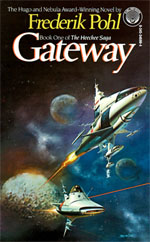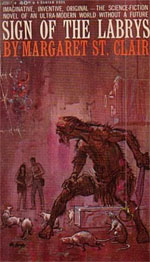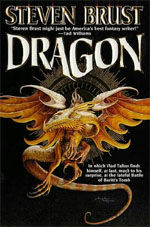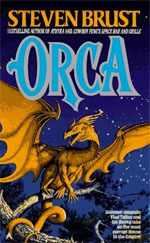 Steven Brust’s Khaavren Romances comprise three novels spread across five volumes: The Phoenix Guards, Five Hundred Years After, and The Viscount of Adrilankha (published as The Paths of the Dead, The Lord of Castle Black, and Sethra Lavode). As the titles might suggest, Brust wrote the entire series as a pastiche of Alexander Dumas (and, most notably, his tales of the Three Musketeers).
Steven Brust’s Khaavren Romances comprise three novels spread across five volumes: The Phoenix Guards, Five Hundred Years After, and The Viscount of Adrilankha (published as The Paths of the Dead, The Lord of Castle Black, and Sethra Lavode). As the titles might suggest, Brust wrote the entire series as a pastiche of Alexander Dumas (and, most notably, his tales of the Three Musketeers).
This is not to say that the novels are merely fantasy regurgitations of Dumas. Far from it. Although the first chunk of The Phoenix Guards is heavily inspired by The Three Musketteers, from that point forward the tales diverge quite rapidly. Brust is merely using the stylings of Dumas to tell his own tale. A tale which, in point of fact, becomes increasingly remarkable as the series continues.
The strength of the series is that it captures the swashbuckling fervor and derring-do of Dumas’ tales, adapts it for its own purposes, and then raises the stakes. Much as Brust’s Jhereg takes the trappings of Raymond Chandler, weds them to high fantasy, and then prefects the resulting gestalt into something unique and powerful, so the Khaavren Romances make Dumas’ stylings their own.
The overwhelming weakness of the series, however, is that it also whole-heartedly embraces Dumas’ weaknesses as a novelist.
There are two unpleasant truths when it comes to the work of Dumas:
(1) He was part of a tradition among many 19th century authors — such as Victor Hugo and Herman Melville — in which the phrase “show your work” was taken to be some sort of holy writ. Their ability to interrupt their own stories in order to engage in long factual discourses with only the most tangential relationship to the surrounding text is truly astounding. The term “infodump” cannot satisfactorily summarize these turgid pace-killers, some of which could persist for the length of an entire chapter before finally drawing to a close.
Such works are aptly parodied in William Goldman’s The Princess Bride, in which the conceit is that Goldman is not actually writing the novel, but rather presenting the “good parts” of a novel by the 19th century author S. Morgenstern. The footnotes in which Goldman describes the material he’s “cutting” for our benefit are made even funnier if you’ve suffered through such passages in Dumas, Hugo, Melville, and their like.
At first, I thought Brust was going for a similar sense of parody. But it quickly became apparent that he was, in fact, embracing the tradition. He succeeds in making it more generally palatable (mostly by limiting the interminable length of such passages), but he is not always wholly successful in his efforts.
(2) Similarly, it is important to understand that Dumas was effectively paid by the word. And Dumas was quite adept at wringing as many words as he possibly could from his work. Brust enthusiastically captures this “art” in passages like this one:
“If there is a conspiracy around me, Jurabin,” said the Emperor, “I am unable to see it.”
“It is not, perhaps, a conspiracy, Sire,” said the Prime Minister.
“It is not?”
“Perhaps not.”
“Then, you are saying that perhaps it is?”
“That is not precisely my meaning either, Sire.”
“Well then,” said the Emperor, “What is your meaning?”
“To speak plainly—”
“The Gods!” His Majesty burst out. “It is nearly time for you to do so!”
“I believe that many of the Deputies are, quite simply, afraid to appear.”
“Afraid?” cried the Emperor. “Come, tell me what you mean. Are they afraid of me, do you think?”
“Not you, Sire; rather, of each other.”
“Jurabin, I confess that I am as confused as ever.”
“Shall I explain?”
“Shards and splinters, it is an hour since I asked for anything else!”
“Well, then, this is how I see it.”
“Go on. You perceive that you have my full attention.”
The first time I read such a passage I thought to myself, “Ha, ha! Very funny! You have aptly parodied Dumas there!”
The ninth time I read such a passage, the joke had worn itself thoroughly thin.
The ninetieth time I read such a passage, I wanted to scoop out my eyeballs with a rusty spoon.
The nine-hundredth time I read such a passage, I decided it was actually Steven Brust’s eyeballs I wanted to scoop out with the rusty spoon.
It’s simply bloat. It’s not funny. It’s not clever. It’s not stylistic. It’s just copy-and-paste, by-the-numbers, rubber-stamped bloat. It’s a form for rapidly generating empty verbiage so that you can fill up your quota for the weekly serial, get paid, and head down to the local tavern.
So why did I keep reading — even after I had long since perfected the art of detecting passages like this and adroitly skimming ahead a page or two pages in order to get the next bit of pertinent narrative?
Because the stories are, in point of fact, quite compelling. The plot is epic in its scope and fascinating for the depth of insight it gives you into the Dragaeran Empire. The action is both exciting and humorous. The characters are charming, endearing, and memorable.
In short, despite their rather systematic failings, I have no hesitation in recommending the Khaavren Romances.
I would, however, heartily recommend starting with the Vlad Taltos novels. A good deal of the fascination I had for the setting derived from my knowledge of the Taltos series, and I’m not sure I would have actually persevered if I did not have the context of the Taltos novels in which to root the Khaavren Romances.
GRADES:
THE PHOENIX GUARDS: B-
FIVE HUNDRED YEARS AFTER: B-
THE PATHS OF THE DEAD: B-
THE LORD OF CASTLE BLACK: B-
SETHRA LAVODE: B-
Steven Brust
Published: 1992 / 1995 / 2003 / 2004 / 2005
Publisher: Ace
Cover Price: $7.99
ISBN: 0812506898 / 0812515226 / 0812534174 / 0812534190 / 0812534182
Buy Now!
 I often think of Gateway as being the last great hurrah of the Golden Age of Science Fiction. Although published in 1977, to me it has always felt like a Campbellian classic — as if it should be a contemporary of Childhood’s End or the Foundation Trilogy. A throwback to the 1950’s.
I often think of Gateway as being the last great hurrah of the Golden Age of Science Fiction. Although published in 1977, to me it has always felt like a Campbellian classic — as if it should be a contemporary of Childhood’s End or the Foundation Trilogy. A throwback to the 1950’s.














